Natalie Sanders, founder of Body Positive Barre, places accessibility, inclusion and joy at the heart of each practice.
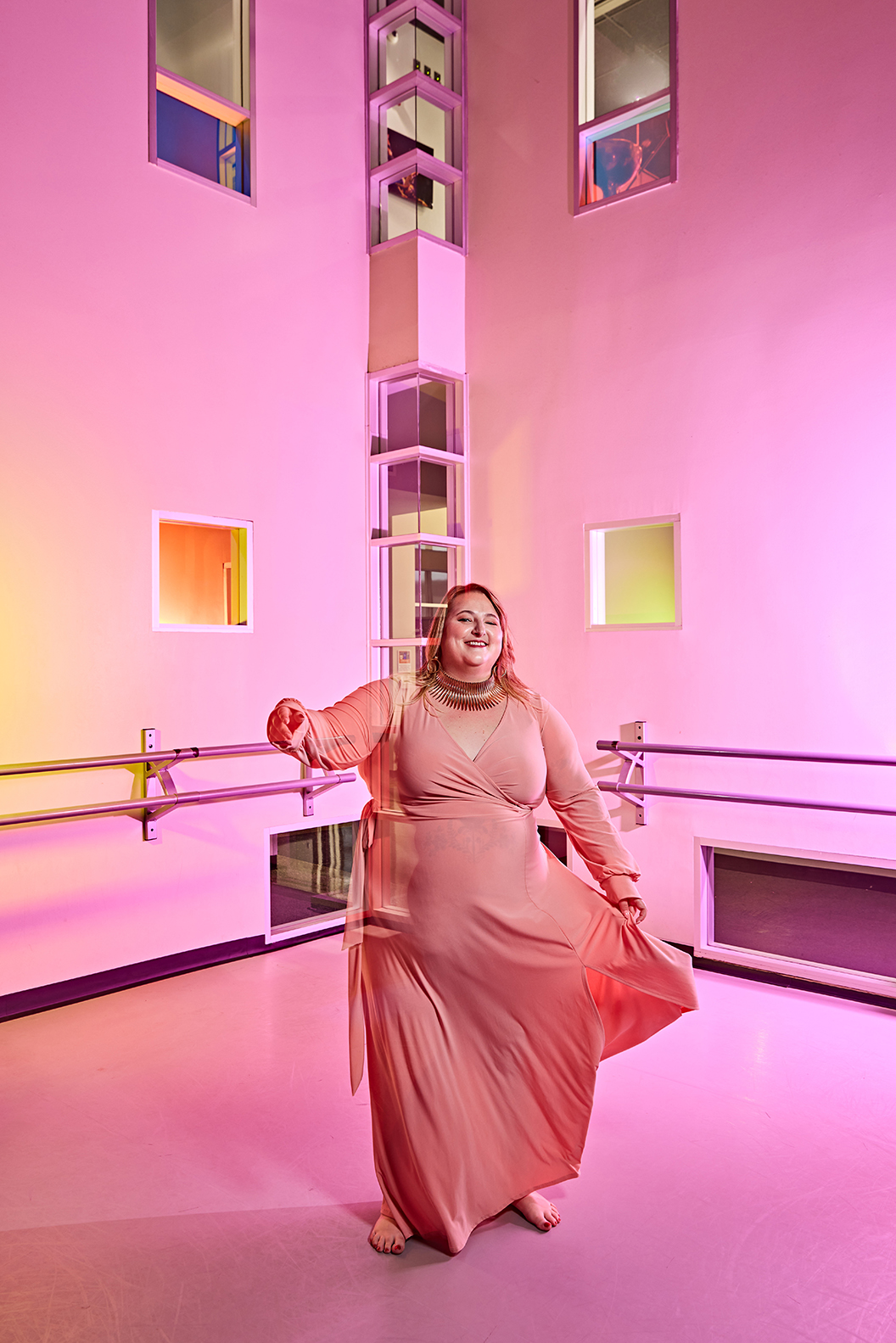
By Stacey Ingram Kaleh, Photos by Annie Ray, Styled by Thedies Broussard, Makeup by Courtney Graham, Shot on location at Ballet Austin
Warm and energetic, Natalie Sanders is one of those Austinites who feels like a neighbor you’ve known for years. With gracious confidence and seriously positive energy, she exudes the passion of someone who leads with mindfulness and intention.
“I want to be myself and feel confident and secure,” Sanders says. “Trying to make that accessible to everyone is hard, and I like to think I’m doing a little tiny bit of the puzzle to invite people in to see the benefits of movement. I just want people to move a little bit and feel a little bit better every day. I want to help everyone feel good about themselves.”
Founder of Body Positive Barre, often called “Body Posi Barre,” which she describes as a low- impact, high-intensity strength training practice that merges yoga and pilates, Sanders manifests her vision of community while also working a full-time job at a multinational corporation. A self-described fat-bodied woman and advocate for fat liberation, she breaks down barriers and challenges misconceptions by leading accessible, inclusive and fun barre classes. She also creates body positive social media content to empower “women, men and nonbinary folx in bigger bodies” to get moving and take charge of their lives and health.
Motivated to Live Generously and Authentically
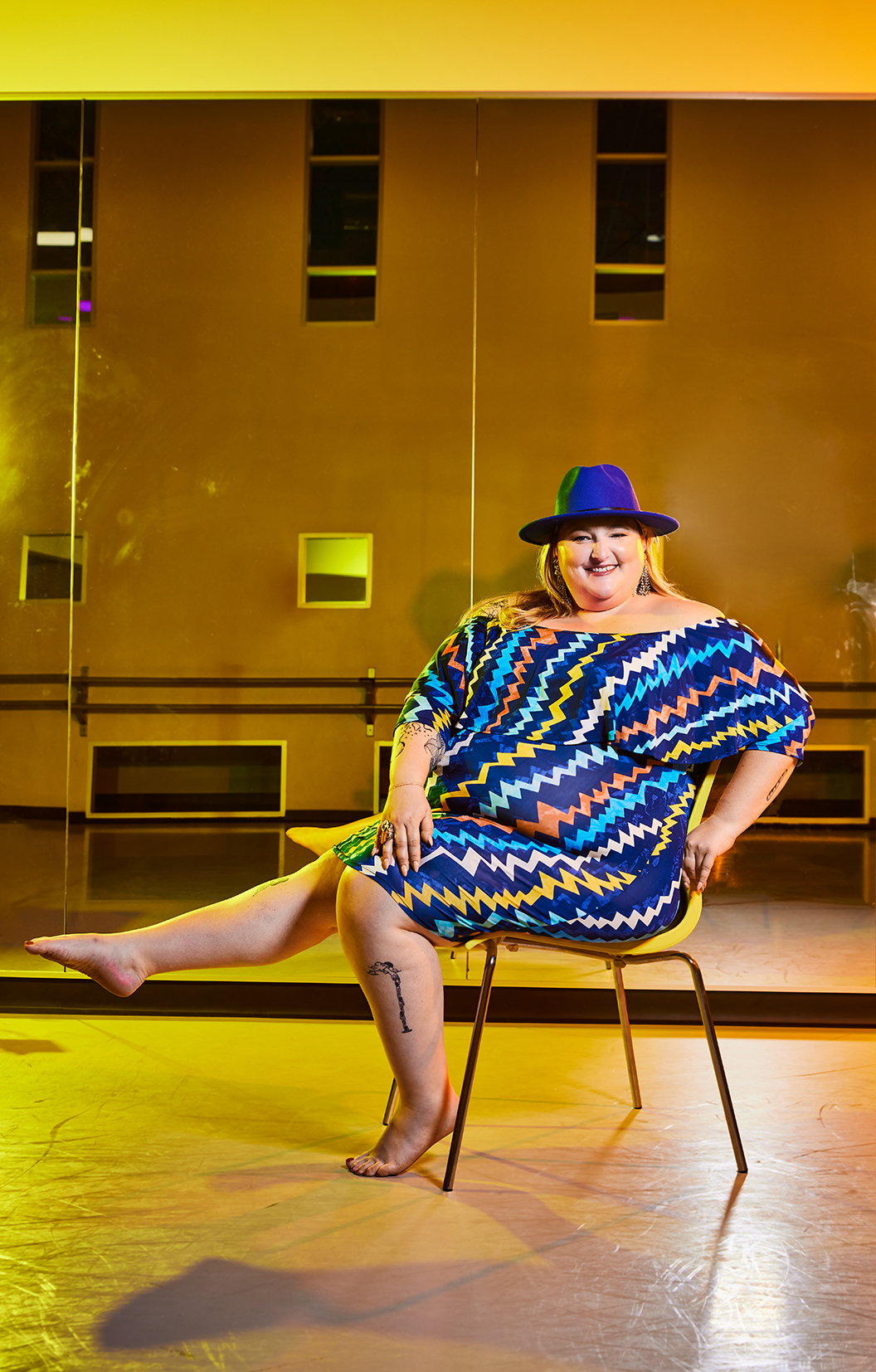
“I have the Type A, responsible oldest sister personality,” Sanders says with a smile. She grew up in Chicago, the oldest of four girls in a close-knit family she said embraces a “girl power, women to the front” attitude.
One of her sisters, Monica Sanders, describes her as “genuine, hardworking and strong.” Maggie Marek, Natalie’s friend since high school and former college roommate, describes her as a lover of life. “[She’s] driven and high energy,” Marek shares. “From her rad style, including lots of tattoos and fashionable workout gear, to her fun and welcoming personality, Natalie is unapologetically herself.”
Both women are also clients of Natalie and are more than happy to champion her, which speaks to her dedication to both surround herself with supportive women and in turn support other women as friend, sister, advocate and teacher. “Natalie is the kind of friend and instructor you want in your corner,” Monica shares, “She really is a fierce advocate for loving all that you are and being proud of the space you take up. Her confidence is contagious!”
When recounting her personal journey, Natalie focuses on volunteer experiences that shaped her worldview. “I grew up with my family thinking about how we could help folks with less access get better access to things,” she says. As a student at the University of Illinois at Urbana-Champaign studying food science and human nutrition, she prioritized volunteerism and oversaw a program called Best Buddies, which focused on pairing students at the university with folks in the community with varying disabilities. Her volunteer experiences helped her understand that interacting with people and communities different from you, bridging divides between folks with greater access to resources and those without, helps everyone grow. She also saw firsthand how everyday acts of generosity create meaningful change. “That experience encouraged me to be an activist after college, too, when I realized that little interactions can make a big difference in folks’ lives and my own.”
Natalie is also open about her relationship with her mind and body, past and present. “I definitely have carried myself very confidently as a fat kid, a fat teen and then a fat young woman, and now, into my 30s. If people are bullying and making comments about [my]appearance, I don’t allow it to bog me down but instead understand that most of the time that’s a projection or that’s someone else’s belief because they haven’t been able to do any internal work. I’ve been able to change the narrative.” She confides that it’s been a decade of work, really looking internally and going to therapy. Today, she seems secure in her own views, stating her own truth and her core mission to help others.
After graduating from college, Sanders began a career in sales for a multinational corporation. She still works for the same company, and although it is evident she enjoys her full-time job, she shares, “I think I always knew I wanted to work for myself in some way, shape or form.” From her perspective, experience in sales has equipped her with the skills to start and develop her personal business plan with lofty, yet realistic goals.”
Body Posi Barre Breaks Down Barriers
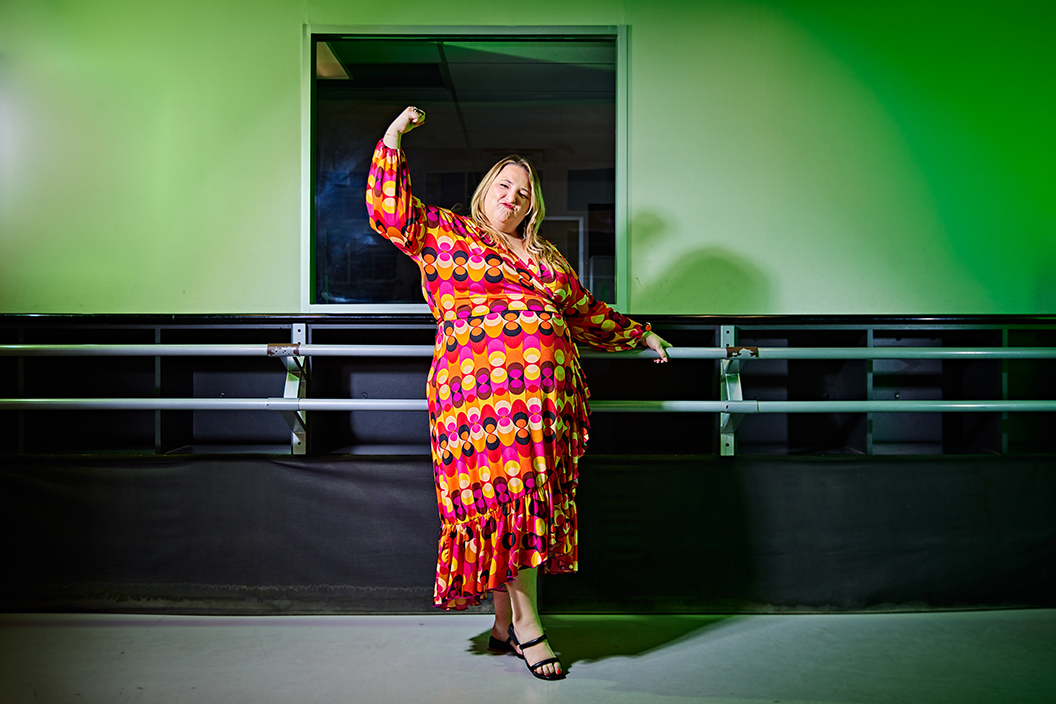
About 10 years ago, Natalie moved to Austin, a place she’s proud to call home. She credits the support of the Austin community in helping her take the leap to pursue her passion. “A lot of people in Austin are here because they choose to be here,” she says. “I see a lot of other women doing what fuels their soul, and being surrounded by that is really incredible.” Sanders shares that there’s something about the open-minded, laid-back attitude that Austinites embrace that helps her feel comfortable moving and being seen. She also appreciates that advocating for yourself is accepted in our community—it’s part of keeping Austin weird. In her decade here, she’s built a local support system by surrounding herself with “strong women who also own or are starting businesses.”
Sanders’ childhood career dreams included working in a field that involved movement, such as lifeguarding or athletics. During the pandemic, she spent time self-reflecting, then seized the moment to start an online business to revisit those dreams. Now, a few years into leading Body Positive Barre, she’s confident she’s doing something that both fuels her and helps others.
“I wanted to combine fitness and movement into something fun that could bring others along with me,” Natalie says. “I’ve been able to do that by teaching Body Positive Barre classes on the side.” She teaches live virtual classes via Zoom on Mondays and Thursdays and distributes recordings that reach people all over the world, from London and Paris to all over Canada and the U.S. Natalie has recently started to lead a few in-person classes and host meetups around Austin at venues like Waterloo Greenway and Barton Springs.
Along her journey, Natalie has become very attuned to the language she uses to empower herself and those around her. “I very much use the word ‘fat’ as a regular descriptor of body type these days, realizing that a lot of folks still equate fatness to something bad or as an insult,” she says. “But I’ve been part of the fat liberation movement that reclaims that word and makes it our own.” In fact, she prefers using the term “fat-bodied” instead of body-neutral language now because it carries a sense of radical acceptance.
“Body positivity has been co-opted by people in thin bodies,” Natalie says. Though she’s received some resistance and pushback about her branding, she’s intent on reclaiming the movement. “The body positive movement has moved a little bit away from fat liberation, which is focused on making sure there’s access to health care, chairs and equipment and clothing that fits fat people, and the activist side.”
In light of the movement to reclaim and repurpose the derogatory connotations surrounding the word “fat,” the question becomes what does “body positivity” mean? Natalie defines it as “actually feeling positive about being in your own body and interacting with the world.” She incorporated the concept into her brand name to signal that she was creating a safe space for people in bigger bodies. “I want to invite more people into the conversation and into the fold.”
In many ways, barre could be considered exclusionary. Derived from ballet, there are some who consider it exclusive to a “certain” body type. However, Natalie sees barre as a great way to change perception and help people incorporate movement into their lives in a meaningful way. “Barre classes are notoriously challenging,” she says. “You see a lot of thin, specifically white women in those spaces and studios. Sometimes, just being a person in a bigger body walking into that class is a barrier to entry.
“I don’t know how many stories I’ve heard, myself included, of going to a fitness class and getting called out by the instructor, feeling like shit leaving the class instead of feeling, ‘I did all of those really hard things in the class. I couldn’t do this one thing, but I could do everything else.’ All you’re focused on is that negative thing you couldn’t do instead of celebrating all the movement that you did. I tell people to just explore how movement feels in their bodies. Rest when you need to. Feel good about what you’ve done. Great job, and let’s do it again tomorrow.”
She recalls steep class prices, spaces that feel like they require “cute new workout outfits” or where instructors call you out. “By breaking down some of that—you don’t have to go to the gym, you don’t have to even be dressed, you don’t have to have your camera on when you’re taking an online fitness class—it allows folks to just show up as they are from where they want to be.”
Body Positive Barre places accessibility, inclusion and joy at the heart of each practice.
“When I think about how I’m going to teach a class, choreograph the class, the music I’m going to add, I want it to all be from a lens of ‘fat people are at the front,’” says Natalie, “So I’ll show a modification of a move first, and I’ll think through how I talk about a move from the perspective of the person in the room who might be the most intimidated.”
Body Positive Barre classes typically range from 30 minutes to one hour, and each class has a curated playlist. For example in one recorded session, the music was sunshine-themed. She played Smash Mouth’s “Walking on the Sun,” Weezer’s “Island in the Sun,” Madonna’s “Ray of Light,” and many other similarly themed tunes, setting a bright and welcoming tone.
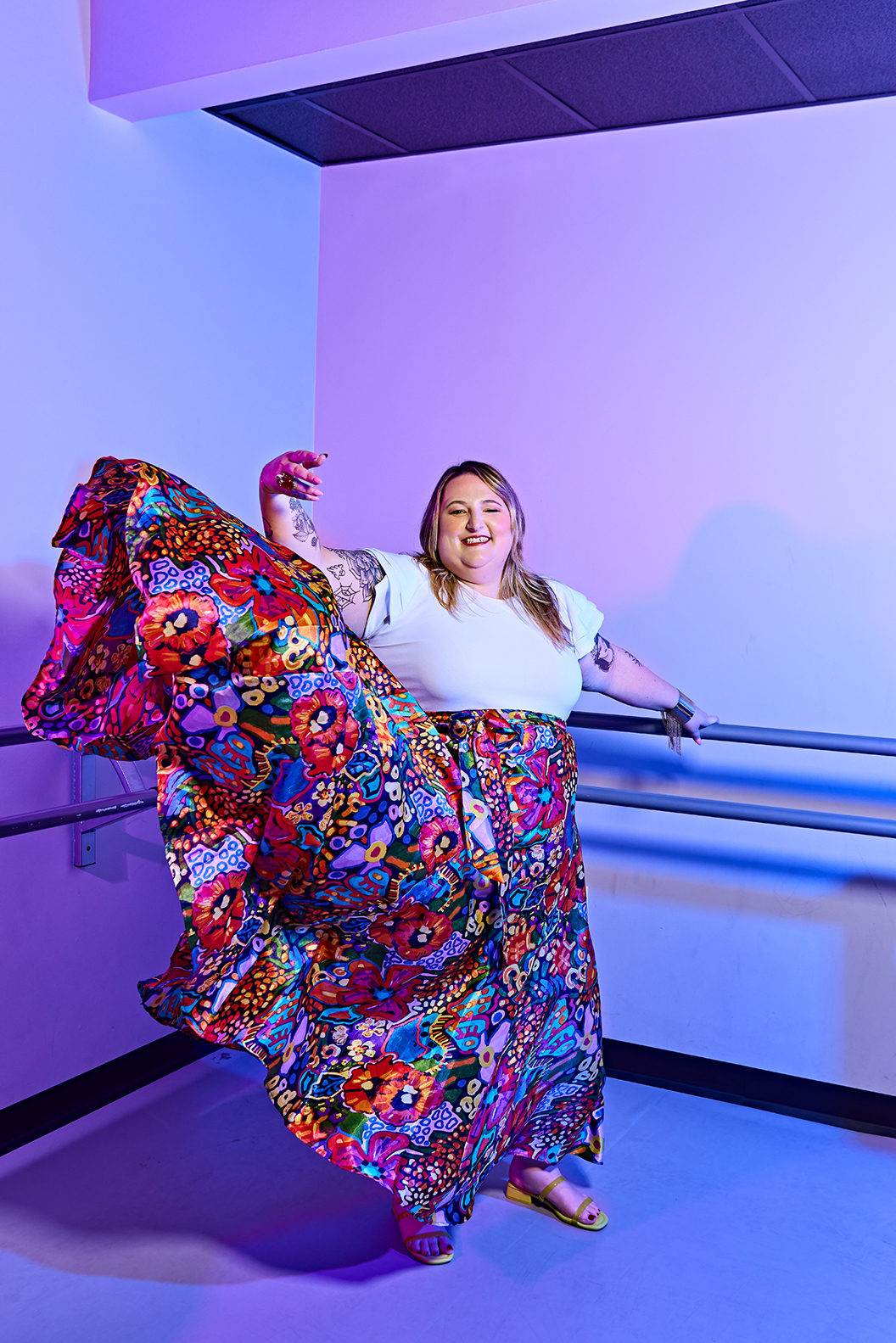
Natalie designs her classes so people can choose to use the equipment available to them, and teaches at least one fully seated class each month. At the top of each class, she announces that it’s okay to drop in and out as needed and to pause to get water, and models taking breaks. She also focuses on allowing the joy of movement shine through. By doing so, she helps people adopt a rhythm of movement that works for them and is sustainable, as opposed to an “all or nothing” approach to fitness.
At the end of the class, she closes by encouraging participants to give themselves a hug and say, “Thank you, body.”
Uniquely Suited to Share Her Expertise
Natalie’s passion and innovation in her accessible approach to barre is backed by her credentials. She’s certified by the International Ballet Barre Fitness Association, is pursuing her certified personal trainer certificate and is currently in the process of completing a 200-hour yoga instructor training that incorporates both movement and meditation. All of this training, paired with her bachelor’s degree in food science, gives her an edge in providing a well-informed and mindful experience for her clients in a generally unregulated field.
What’s more, Natalie was mentored by fitness instructor and therapist Kim Gould Fry, CEO of Autonomy Therapy (formerly Autonomy Movement) in Austin to be trauma-informed in her approach. “I don’t use any negative body talk in any way,” Natalie says. “Even if I’m inviting folks to close their eyes, I make sure to say, ‘Close your eyes if you feel comfortable.’ There’s never any talk about food during class at all, since I work with a lot of folks who are in eating disorder recovery.”
She’s also learned much from peers in the community, such as Jessamyn Stanley, owner of The Underbelly Yoga. “She moves her belly out of the way to do a forward fold or talks about her thighs being a little bit bigger and the need to position her legs further apart to do a lunge,” Natalie describes. She embraces a similar approach in her own classes, where body differences are acknowledged and accommodated with the goal of allowing everyone to feel comfortable. “Acknowledging our bodies is not positive or negative; it’s just a matter of fact.”
Natalie takes pride in ensuring her clients feel safe and aren’t discouraged by any negative messaging or rigid techniques. “Just because a class is body positive does not mean it will be easy, but it is doable!” Marek shares. “Natalie encourages participants in her classes to push their limits in a safe and encouraging environment by offering lots of modifications.”
Prioritizing Advocacy
Natalie paints a clear and disheartening picture: With deeply entrenched biases in our society, from gyms and barre studios to the workplace and doctor’s office, people in bigger bodies often aren’t supported in their journeys to meaningful movement. “We get constant messages about how we should feel, what we should wear, how we should be eating, what we should be drinking, what music we should be listening to and which movies we should be watching,” she says. “Reclaiming and being with yourself through your own practice of movement, whatever you choose to do, is a radical form of ‘F the System!’” Sanders is eager to help people take control of the narrative by becoming self-advocates,
A major inspiration of Natalie’s journey to challenging the mainstream narrative and increasing representation was Gabi Gregg (GabiFresh), a blogger-activist who introduced her audience to the term “fatkini” in 2012, posting a picture of herself in a high-cut two-piece swimsuit. “She challenged people to disregard the beauty standards and forces at work telling us it’s not good to have fat rolls or stretch marks,” Natalie says. In 2013, she went to a pool in Austin wearing a bikini for the very first time.
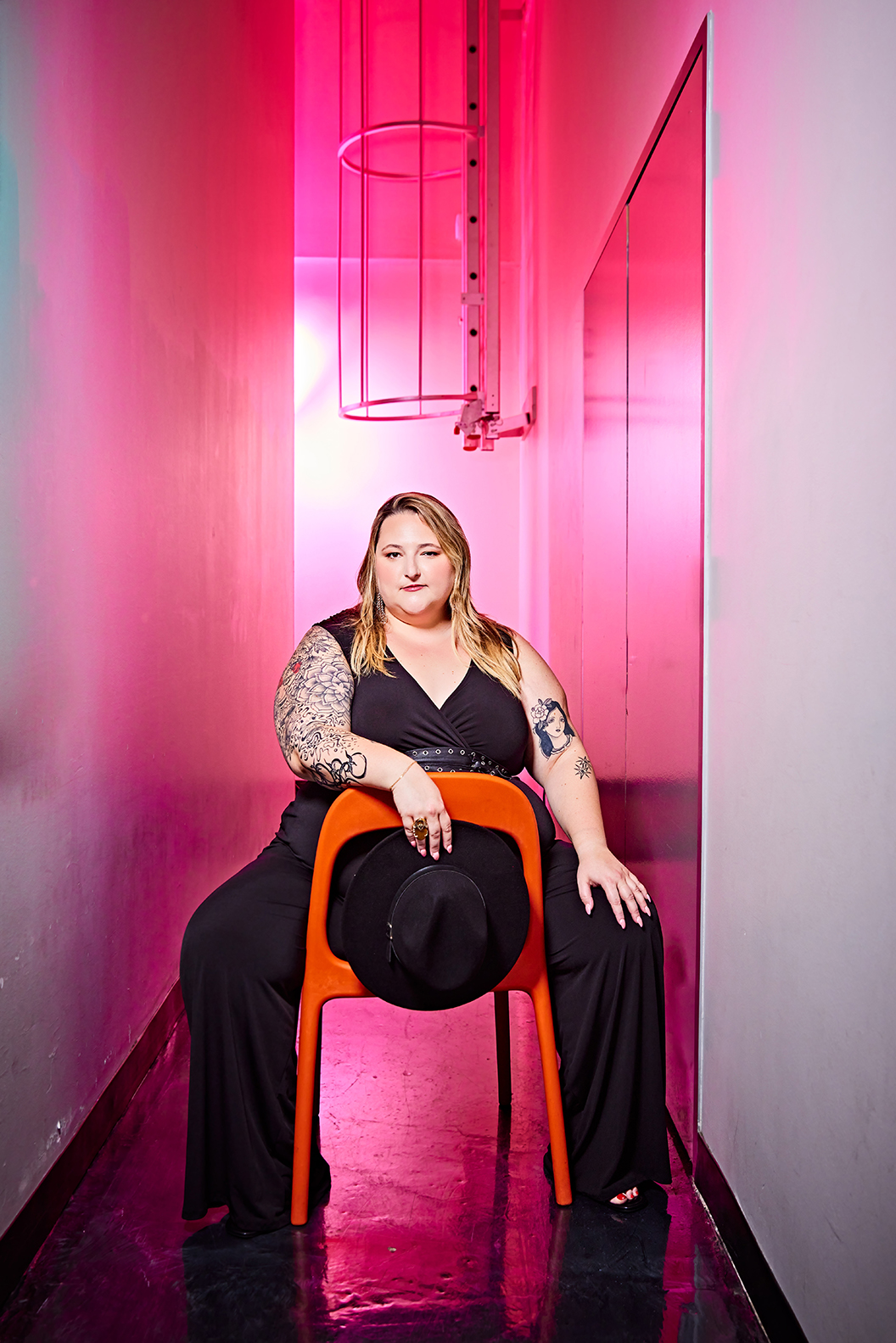
Fat Liberation
“Representation is what got me into feeling like a fat activist,” Natalie reveals. While she demonstrates what she’d like to see more of through her classes, she also speaks to her personal experiences and the fat liberation causes close to her heart via her Instagram profile (bodyposibarre), which boasts upwards of 12,000 followers. She also practices what she preaches on her TikTok (bodiposibarre), which so far has a tight-knit community of over 300 followers.
While the beauty aspect of the fat liberation movement piqued her interest, Natalie’s eyes were soon opened to the many layers of fat activism: calls for more inclusive clothing, workplace hiring and promotion practices, work to reduce biases in the health care system and more. She’s learned a great deal by listening to people who have long been in the arena. “Black women have led the fat liberation movement for a long time,” she says. “Really making sure that I’m listening to the right people and making sure I’m learning from the people who have been doing this a long time first is something I’m passionate about.
“What’s even more important than the beauty aspects is understanding the lack of access to health care and preventative care. We use terms like ‘obese’ and ‘BMI,’ all of these different terms that are barriers to folks to getting care that would extend their life,” she continues. “You can be denied certain medical procedures; you can be denied a doctor who respects you if you’re a person who can’t get pregnant and wants to get pregnant. You might just be met with, ‘You need to lose weight before then,’ and then the doctor walks out of the room. There’s no ‘how to lose weight’ or asking if you already diet or if you already work out.”
Natalie posts to Instagram every time she goes to the doctor, encouraging people to speak up for what they need from medical professionals. “If I can go to the doctor, walk in, and they say to me by just looking at my body without checking any of my vitals, ‘You need to lose weight;’ if I am able to say, ‘Well, I already move; I already workout’; and to think about what I’m wearing—I’m never going to go to the doctor in sweatpants, but in a workout outfit or even business casual to be respected—walking in looking serious and sounding serious, taking control, that to me is a win.”
She views Instagram as a platform to help people in bigger bodies “navigate the systems of oppression around us. The more representation, the more practice, the more exposure, the more that we’re all going to win and feel better about ourselves and actually be healthier. I just enjoy helping others feel good about themselves,” she emphasizes. She asks people to examine their autonomy and encourages them to question biased social norms and capitalist tendencies. “I try to remind people to ask ‘Who is putting this idea in your head? Who’s profiting off this?’”
Her storytelling content takes what she’s modeling in her classes a step further to create safe spaces not only for physical, but social movement. “If we find a space that we actually want to move in, which is what I’m trying to create with my classes and platform, then we have the confidence to carry ourselves through the world that way.”
Calling Us to Leave Our Comfort Zones Behind and Live Freely
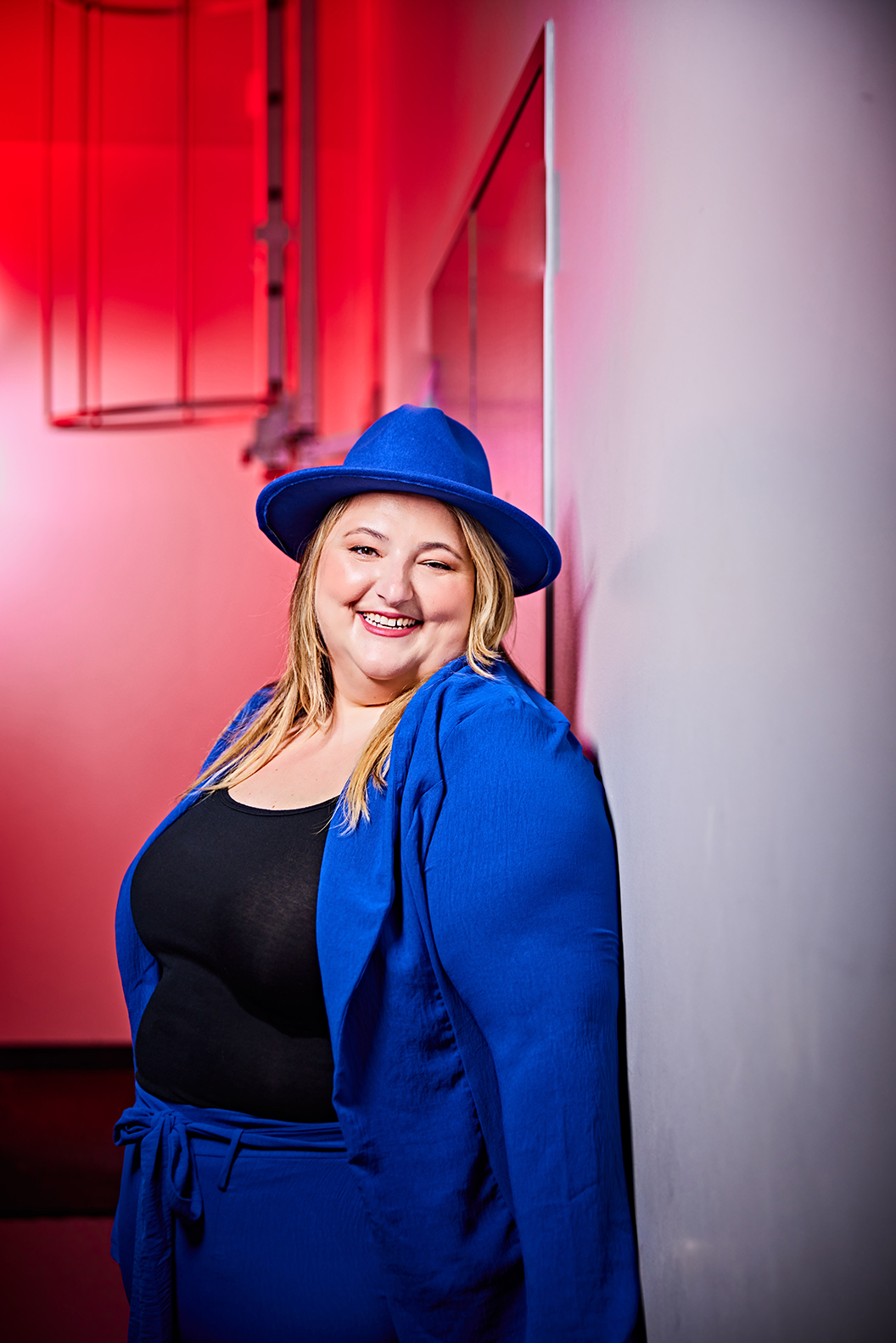
Ever the optimist, she believes that society will continue to make positive strides in increasing fat representation and encourages us to do what we can to support. “Tackle what you can, that little bit,” she says. Our small actions work together to create a larger, collective impact, and “help[s]some of the other puzzle pieces find their way. Seek out different opinions and experiences from people who are living that experience. Lead with empathy and also take advantage of the amazing resources we have here in Austin. Try taking a class from someone who looks different than you, something you haven’t done before, like a yoga class or pilates class or a dance class, to really get outside of your box and see and experience new and different things.”
This is advice she follows herself, constantly expanding the boundaries of her comfort zone. For example, she’s recently tried a Splash Dance water aerobics class with Erika Nix, who explores movement as a form of political activism. Natalie is starting to insert herself into more visible spaces by getting more involved in the community and offering in-person classes in public spaces like Waterloo Greenway and participating in events like the Future Front Texas Plus-size Clothing Swap.
Natalie hopes we can get away from a diet culture lens for everyone’s sake, curate our experiences and social media feeds to be more diverse and inclusive of fat-bodied women and to do the self-work to mitigate biases. “I think if we can truly divest from a belief that thin is best, thin bodies are best, if we can really understand as a group that health looks so different for different types of people and get away from just the outside of the body experience versus what’s actually going on the inside, then that will be so much better.” That means creating access to health care and mental health care that allows each person to receive a unique, data-based diagnosis and individualized care to “get to our best selves.”
“If we can get away from more of these beauty ideals and get more into being ourselves, get to a place of peace with ourselves, we might interact with the world around us a bit nicer and gentler too.”
Living Life Right Now
All the work Natalie does paints a vision of moving through life with radical acceptance and confidence. “I want people to know that they can start living their lives right now. You don’t have to change your body and wait to travel, to find love or to find community. You can do that right now, no matter how you look. You don’t have to wait to start.”

